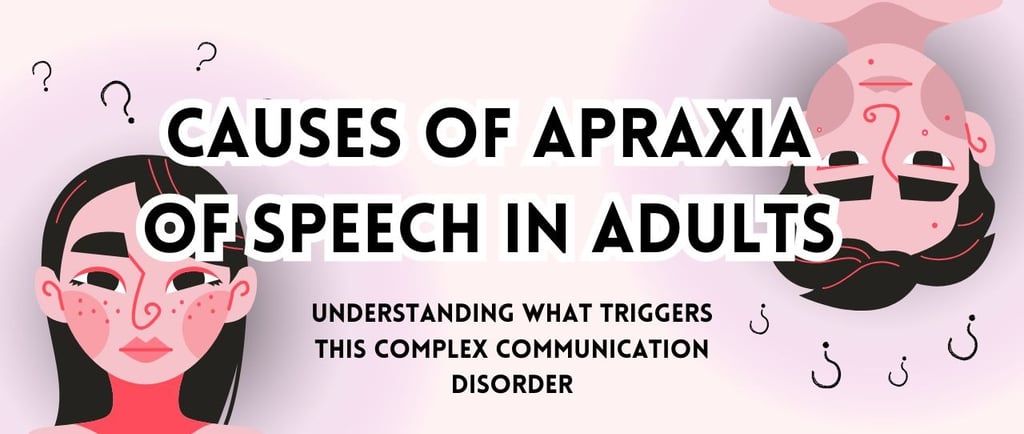Online Speech Therapy Platform
Causes of Apraxia of Speech in Adults
Understanding What Triggers This Complex Communication Disorder
APRAXIA
7/21/20252 min read


Apraxia of speech in adults is a neurological motor speech disorder that makes it difficult to plan and coordinate the movements needed for speech. While the speech muscles may be healthy and strong, the brain struggles to send the correct signals, leading to disrupted speech.
In this article, we’ll explore the most common causes of adult apraxia of speech, helping patients, families, and caregivers better understand the condition.
🧠 What Is Apraxia of Speech?
Before diving into the causes, it’s important to understand that apraxia of speech (AOS) is not a language disorder or muscle weakness. Instead, it’s a motor planning disorder — the brain knows what it wants to say, but it can’t properly coordinate the muscle movements to say it.
🔍 Top Neurological Causes of Apraxia of Speech in Adults
1. Stroke
A stroke is the most common cause of apraxia of speech in adults. When a stroke affects the left hemisphere of the brain—particularly the Broca’s area—it can interrupt the motor planning pathways needed for speech.
Apraxia often co-occurs with aphasia (language disorder) after stroke.
Damage may be localized or widespread, depending on the severity of the stroke.
2. Traumatic Brain Injury (TBI)
Head trauma from accidents, falls, or injuries can cause damage to the motor speech areas of the brain. Depending on the site and extent of the injury, TBI can lead to:
Motor speech disorders like apraxia
Language impairments
Memory and cognitive issues that impact communication
3. Neurodegenerative Diseases
Apraxia can also develop gradually in patients with progressive neurological conditions. These include:
Primary Progressive Apraxia of Speech (PPAOS): A degenerative condition where apraxia is the primary symptom, often leading to other motor speech and language disorders.
Parkinson’s Disease
Multiple Sclerosis (MS)
Amyotrophic Lateral Sclerosis (ALS)
In these cases, speech often worsens over time without intervention.
4. Brain Tumors
A tumor in or near the brain's speech motor planning centers can cause apraxia. The symptoms may develop gradually or suddenly if the tumor grows rapidly or bleeds.
5. Dementia and Alzheimer’s Disease
While primarily associated with memory loss, some forms of dementia—especially frontotemporal dementia—can affect speech planning areas, resulting in apraxia.
6. Infections and Inflammation
Severe brain infections such as:
Encephalitis
Meningitis
Autoimmune encephalopathies
These conditions can damage areas of the brain responsible for motor coordination and speech production.
7. Anoxia (Lack of Oxygen)
Conditions like cardiac arrest or near-drowning can cause the brain to lose oxygen, damaging critical areas involved in speech and motor function.
🎯 Why Understanding the Cause Matters
Identifying the underlying cause of apraxia is crucial for treatment. For example:
Stroke-related apraxia may show improvement with structured therapy.
Progressive apraxia may need ongoing therapy to manage declining function.
Understanding the neurological root helps tailor speech therapy goals, predict recovery timelines, and guide caregivers in planning support.
🌐 Can Apraxia Be Treated Online?
Yes! With platforms like TelloMeet, adults with apraxia of speech can access expert speech-language pathologists (SLPs) through teletherapy. These one-on-one sessions help patients:
Relearn motor speech patterns
Improve intelligibility
Boost confidence in everyday conversations
📞 Ready to Get Help?
Our licensed speech therapists are here to support you every step of the way.
👉 Book your free consultation with TelloMeet today!
